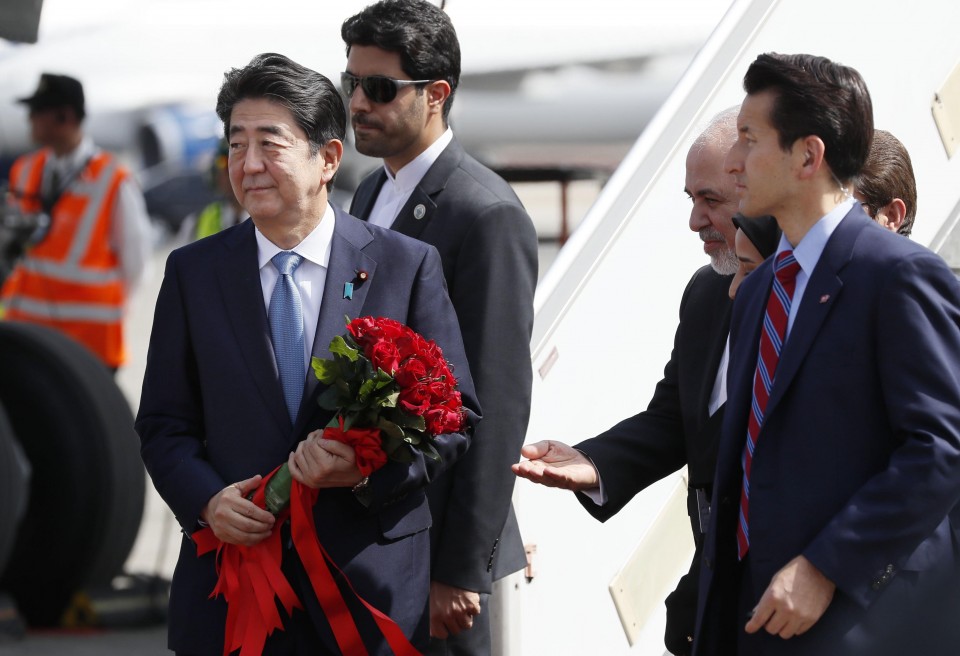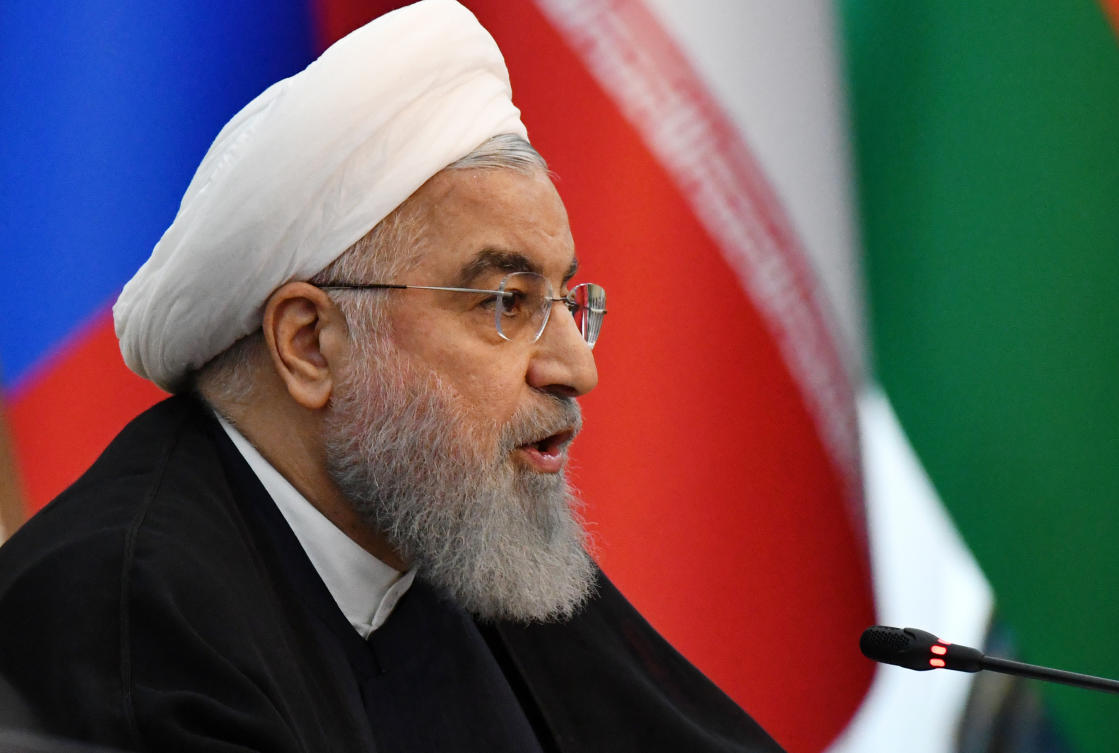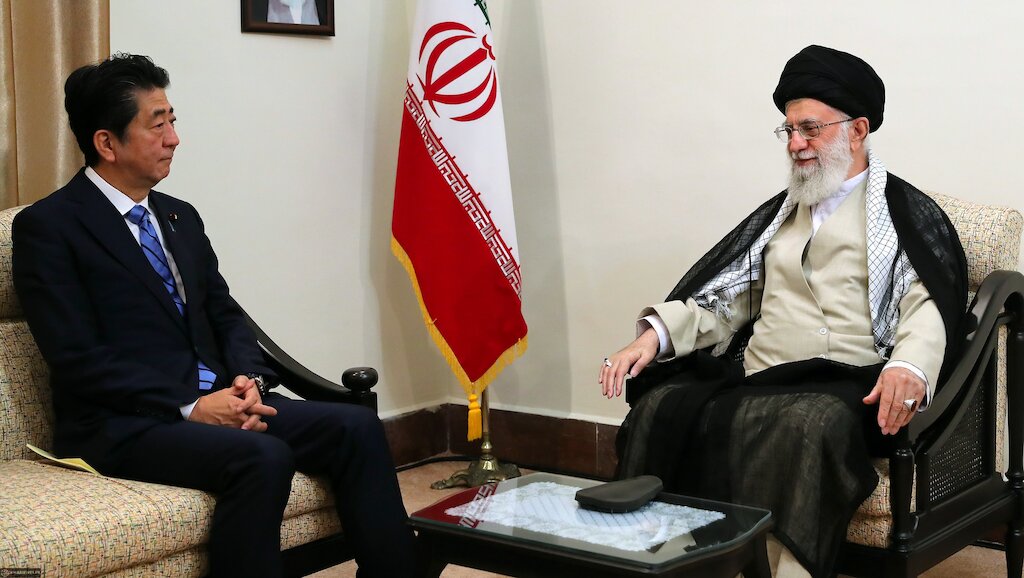Persian Gulf
MEMBER
This thread also disputes the veracity of the video the US put out and is worth a read:
Japan PM Shinzo Abe arrives in Iran in bid to ease tensions as mediator

Japanese Prime Minister Shinzo Abe arrived in Tehran on Wednesday as he tries to position himself as a mediator between Iran and the United States to help reduce heightened tensions between them. Abe, the first sitting Japanese prime minister to visit Iran since Takeo Fukuda in 1978, will hold talks with Iranian President Hassan Rouhani later in the day.
Abe's itinerary also includes a meeting with Iran's Ayatollah Ali Khamenei on Thursday. It will be the first time a Japanese prime minister has met with the supreme leader, who ultimately determines the country's policy direction.
"There are concerns over rising tensions in the Middle East. While the situation attracts the attention of the international community, for peace and stability in the region Japan wants to play a role as much as it can," Abe told reporters at Tokyo's Haneda airport before departing for a two-day visit to Tehran. "To ease tensions, I'd like to have a frank exchange of views" by taking advantage of Tokyo's traditionally friendly ties with Tehran, Abe said.
Abe's symbolic visit comes as Washington has left the door open for dialogue despite its abrupt withdrawal last year from the nuclear accord and the reinstating of economic sanctions. Japan is not a member of the deal but has been a supporter.
The trip gives Abe a rare opportunity to raise his diplomatic profile ahead of a Group of 20 summit in Japan on June 28 and 29 before an election for the upper house this summer. The challenges for Abe appear to be manifold, including smoothing the way for potential dialogue between Iran and the United States, Japan's longtime security ally, by helping bridge the rift between them. But Abe would not simply be a mediator, Japanese officials say, as Tokyo's aim is to ensure stability in the Middle East, a critical factor for resource-scarce Japan. Iran had long been one of the major oil exporters until the United States ended its sanctions waivers granted to Iranian crude buyers.
Before making the trip official, Abe secured backing from U.S. President Donald Trump, who was on a state visit to Japan in late May, for his efforts to reach out to Iran. Abe also spoke by phone with Israeli Prime Minister Benjamin Netanyahu and the crown princes of Saudi Arabia and Abu Dhabi.
Tensions in the Middle East have risen in recent weeks, roughly a year after Trump's decision to leave the international nuclear accord that led to the lifting of economic sanctions on Iran in exchange for its curbing of nuclear activities. Iran said in May it was suspending some of its commitments under the deal. Tehran set a 60-day deadline to negotiate new terms, saying it would keep more enriched uranium than allowed under the agreement initially reached with the United States, Britain, France, Germany, Russia and China. Washington has dispatched an aircraft carrier strike group and bombers to the Persian Gulf, and decided to send additional U.S. troops to the region.
Trump's more aggressive approach to Tehran has prompted a delicate balancing act by Japan, which marks the 90th anniversary of its diplomatic relations with Iran this year. Since returning to power in 2012, Abe has held seven meetings with Rouhani.

Abe urges Rouhani to avoid escalation of Iran-U.S. tensions
Japanese Prime Minister Shinzo Abe called on Iranian President Hassan Rouhani on Wednesday to avoid a further escalation of tensions and an unintended military conflict in the Middle East, as he sought to nudge Tehran toward dialogue as a mediator with the United States.english.kyodonews.net
This thread also disputes the veracity of the video the US put out and is worth a read:
"bombed"?LoL at the red roses. He came trying to de-escalate the tension but got his oil tanker bombed by the IRGC.
Well you can believe what you like... Iran did not claim that specific boat in the video was even Iranian, let alone that it was there to rescue the crew. The crew were rescued before that video was taken and indeed taken to Iran (video of them being in Iran on the previous page).I still believe it because of the Mullah destructive history in the region. Not to mention the boat used belongs to the IRGC despite the claim that they were there to rescue the staff.
I think it's total rubbish, why would Iran attack a Japanese ship whilst Shinzo Abe is in Iran, the first visit by a Japanese PM to Iran since 1978?

 www.arabnews.com
www.arabnews.com
The majority of the international community is with the JCPOA which was unanimously endorsed by the UNSC, only the US left that. The majority of the international community (EU, Russia, China, NAM etc) are very opposed to a US war against Iran (with the exception of Israel and maybe KSA).Irrespective, of what it is, the Mullah regime is playing a very dangerous game.
When the majority of the international community is against you, Iran needs to step back and de-escalate. It's big ego, is going to cause destruction for itself first, than the rest of the region.

You didn't get my point i.e. it doesn't matter whether you are right or wrong. What is imperative is to stop the beating of the war drums, and come to the negotiation table. A de-escalation is needed ASAP.The majority of the international community is with the JCPOA which was unanimously endorsed by the UNSC, only the US left that. The majority of the international community (EU, Russia, China, NAM etc) are very opposed to a US war against Iran (with the exception of Israel and maybe KSA).
Iran is in a lose-lose situation to be honest, should we sit quietly and die (/wait for EU to uphold their obligations and make INSTEX work/hope for Trump to lose in 2020) or decide that another round of negotiations with the US are inevitable, thus escalate the situation a bit to create some leverage? At least if Iran withdraws from the JCPOA like the US did it could build up a large stock of more advanced centrifuges and test a longer range BM of around 4000km (a Khorramshahr with a lighter warhead would already do this) to build some leverage for the next negotiations if Iran's leadership decides that it has no choice but to negotiate again.
People mock Ahmadinejad, and for good reason (he was a populist disaster for the economy), but it was only because under him that we built 20,000+ IR-1 centrifuges (strong leverage) that the P5+1 accepted that we can keep 5000 IR-1 centrifuges under the JCPOA.
As for the Gulf of Oman incident(s), the Japanese crew said they were not attacked by a mine, but from the air. So the mine story doesn't add up. The video the US released was clearly edited to be a propaganda tool and doesn't show that Iran planted the mines in the first place. Don't take my word for it, this is what the totally INDEPENDENT analysts at Bellingcat say:
View attachment 8104

Opinion | Was Iran Behind the Oman Tanker Attacks? A Look at the Evidence (Published 2019)
Internet databases confirm much about the incident, but the Trump administration hasn’t provided convincing evidence of Tehran’s culpability.www.nytimes.com
If the US loses nothing in a war with Iran they would have launched this war a long time ago.You didn't get my point i.e. it doesn't matter whether you are right or wrong. What is imperative is to stop the beating of the war drums, and come to the negotiation table. A de-escalation is needed ASAP.
God forbid, in case of war, Iran first, and then the region looses, the US looses nothing. The situation is well beyond the point of who is right and who is wrong.

Japan PM Shinzo Abe arrives in Iran in bid to ease tensions as mediator

Japanese Prime Minister Shinzo Abe arrived in Tehran on Wednesday as he tries to position himself as a mediator between Iran and the United States to help reduce heightened tensions between them. Abe, the first sitting Japanese prime minister to visit Iran since Takeo Fukuda in 1978, will hold talks with Iranian President Hassan Rouhani later in the day.
Abe's itinerary also includes a meeting with Iran's Ayatollah Ali Khamenei on Thursday. It will be the first time a Japanese prime minister has met with the supreme leader, who ultimately determines the country's policy direction.
"There are concerns over rising tensions in the Middle East. While the situation attracts the attention of the international community, for peace and stability in the region Japan wants to play a role as much as it can," Abe told reporters at Tokyo's Haneda airport before departing for a two-day visit to Tehran. "To ease tensions, I'd like to have a frank exchange of views" by taking advantage of Tokyo's traditionally friendly ties with Tehran, Abe said.
Abe's symbolic visit comes as Washington has left the door open for dialogue despite its abrupt withdrawal last year from the nuclear accord and the reinstating of economic sanctions. Japan is not a member of the deal but has been a supporter.
The trip gives Abe a rare opportunity to raise his diplomatic profile ahead of a Group of 20 summit in Japan on June 28 and 29 before an election for the upper house this summer. The challenges for Abe appear to be manifold, including smoothing the way for potential dialogue between Iran and the United States, Japan's longtime security ally, by helping bridge the rift between them. But Abe would not simply be a mediator, Japanese officials say, as Tokyo's aim is to ensure stability in the Middle East, a critical factor for resource-scarce Japan. Iran had long been one of the major oil exporters until the United States ended its sanctions waivers granted to Iranian crude buyers.
Before making the trip official, Abe secured backing from U.S. President Donald Trump, who was on a state visit to Japan in late May, for his efforts to reach out to Iran. Abe also spoke by phone with Israeli Prime Minister Benjamin Netanyahu and the crown princes of Saudi Arabia and Abu Dhabi.
Tensions in the Middle East have risen in recent weeks, roughly a year after Trump's decision to leave the international nuclear accord that led to the lifting of economic sanctions on Iran in exchange for its curbing of nuclear activities. Iran said in May it was suspending some of its commitments under the deal. Tehran set a 60-day deadline to negotiate new terms, saying it would keep more enriched uranium than allowed under the agreement initially reached with the United States, Britain, France, Germany, Russia and China. Washington has dispatched an aircraft carrier strike group and bombers to the Persian Gulf, and decided to send additional U.S. troops to the region.
Trump's more aggressive approach to Tehran has prompted a delicate balancing act by Japan, which marks the 90th anniversary of its diplomatic relations with Iran this year. Since returning to power in 2012, Abe has held seven meetings with Rouhani.

Abe urges Rouhani to avoid escalation of Iran-U.S. tensions
Japanese Prime Minister Shinzo Abe called on Iranian President Hassan Rouhani on Wednesday to avoid a further escalation of tensions and an unintended military conflict in the Middle East, as he sought to nudge Tehran toward dialogue as a mediator with the United States.english.kyodonews.net

I think this will change in 2020 if Trump wins again. Best for Iran to slowly regain leverage by reducing JCPOA commitments and building longer range BM until then.Iran The decisive response leader Ayatollah Khamenei to Japanese Prime Minister Shinzō Abe: I don't consider Trump worth sending a message to, we won't negotiate with U.S.

I don't consider Trump worth sending a message to, we won't negotiate with U.S.
Mr. Shinzō Abe, the Prime Minister of Japan, met with Ayatollah Khamenei-- the Leader of the Islamic Revolution-- this morning June 13, 2019.english.khamenei.ir
